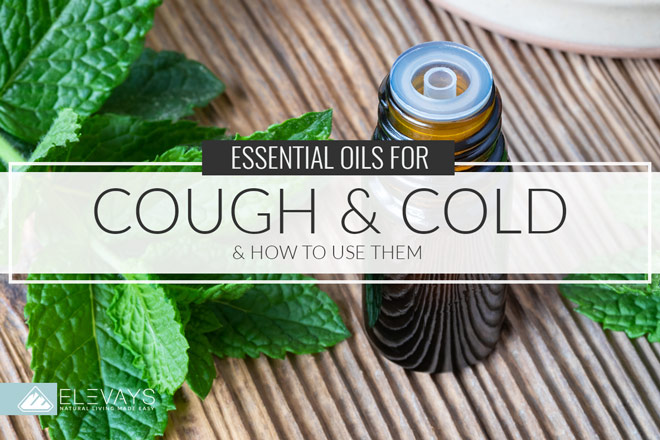You know what symptom sends more people to the doctor than anything else? Coughs. Needless to say, we don’t like them. Who can blame us really? They’re miserable, annoying, exhausting, painful, lingering; we’re desperate to have them end.
As we’re about to see – conventional cough treatments may be doing absolutely nothing for us (other than perhaps adding issues!), so an essential oil for cough may be just the ticket.
But which essential oils for a cough work? How should you take them? And can you use these essential oils for coughing with your children?
I’m going to go through each essential oil for cough one by one, so you can see exactly how each oil will help your symptoms and recovery time. Ultimately, you can use this information to find the best essential oil for cough for you.
But first, let’s understand what we’re dealing with.
Common Causes of a Cough
We need to realize there are two types of coughs that can happen.
We have the acute cough. This is when you have a cold, the flu, pneumonia, bronchitis, etc. Oftentimes your cough is really “wet” and you’re trying to cough up the mucus in your airways (not cute, but real life!); other times it may be that dry, hacking experience.
Then we have the chronic cough. This is what happens during allergies, asthma, GERD, etc. It’s not a side effect of a bacteria or virus, but other health problems within your body. Normally these are drier and can come with hoarseness and shortness of breath.
Sometimes an acute cough can turn into a lingering chronic cough (1).
No matter which cough you’re dealing with, they are both annoying and painful. Both require some tender loving care. But maybe we need to rethink what type of TLC we’re giving our airways.
Why Use Natural Solutions for Coughing
Normally, I would start natural essential oils for a cough by discussing the fact that though a conventional treatment may “work” to clear up your symptoms, the side effects/chemicals/gut issues, etc. make alternative, natural treatments more desirable.
But that’s just not what’s happening in the case of coughs.
Prescription and over-the-counter cough suppressants may be the go-to, but do they really work? Not really.
Studies have shown that popular ingredients like codeine may not even help a cough at all. Even really mainstream medical websites like WebMD discuss the fact that prescription and over-the-counter cough suppressants have never been proven to do much of anything (2, 3, 4).
Then we have the fact that the commonly prescribed codeine is technically a narcotic. You can even have withdrawal symptoms if you’ve had too much or stayed on it too long.
And when it comes to your kids? Well, in the same way, cough suppressants have been shown to have little to no value on children – and they certainly can be harmful. You shouldn’t even try to use them if your little one is under 6 years-old.
Then we have antibiotics as a second go-to. But most of the time, your cough is spurred on by a virus, asthma, allergies etc. – things that have nothing to do with bacteria. And yet time and time again, we are given antibiotics leading us to this ever-growing problem of antibiotic resistance. (I’m not knocking antibiotics entirely – just saying that they are way over prescribed.)
So we are left risking our wellness by taking these conventional cough medications, and they’re not even helping us with the symptoms we’re so desperate to get rid of.
That’s why it’s time to turn to a natural remedy: using an essential oil for cough.
These essential oils for coughing below are going to help both types of cough sufferers:
- If you’re dealing with a cough from a bug, focus on the oils below that offer antimicrobial and antiviral properties. Also, be sure to check out our post on how to get rid of a head cold naturally. Many of these tips will cross over.
- If you’re dealing with a cough from allergies, asthma, etc., focus on the oils that also help those symptoms. I’ll note each below.
Best Essential Oils for a Cough
Now let’s take a closer look at each essential oil for cough and what it can do for you. I’m also going to mention appropriate age ranges with each essential oil, so you can see if it may be a potential help for your coughing little one (4). There’s not a lot of hard and fast data on types of essential oils to use in kids and whether or not they’re safe.
I’ll just tell you from my experience I’ve used a wide variety of essential oils on my kids (including all of the ones listed here) and my primary guidelines are:
- Use a high quality brand intended for therapeutic use
- Use common sense
- Heavily dilute – less is more!
And I’ve never had a problem. I’ve made some notations on oils to be more cautious with (or avoid) in pregnancy, too. But in general, the guidelines apply. I hope this list is helpful for you!
Eucalyptus
Let’s start with the #1 essential oil for cough: eucalyptus. If I could only use one, I’d use this one. It’s an oil found in those old school vapor rubs. But as you’ll find out, you don’t need the other ingredients like petroleum to find some nice cough relief.
Eucalyptus is an expectorant, which means it encourages the mucus that’s just hanging out in your lungs to come out. This helps you have a productive cough that moves your healing along more quickly.
This same benefit makes it a great essential oil for a cough related to asthma.
Even better: eucalyptus is antimicrobial in nature and helps strengthen your immune system. Meaning it’s also going to help you kick your infection to the curb (5).
Cough essential oils for children: Use this oil with caution in children under 2. I’ve used eucalyptus for colds in essential oil blends when our kids were as little as 18 months. I prefer to diffuse it and if I’m using it topically (like on their chest), I’ll heavily dilute in a carrier oil.
Peppermint
Peppermint is one of the best all-round oils for cold-like symptoms, including allergies (Let’s be honest, it’s one of the best all-round oils for just about anything!).
Peppermint helps decongest your nose, soothes a sore throat, and, of course, calms a cough. This means it’s a great solution for both chronic and acute coughs (6).
When used as an essential oil for cough specifically, peppermint helps by relaxing the muscles of your airways and improving overall breathing (7).
Cough essential oils for children: Use this oil with caution in children under 2. I’ve used Peppermint for stuffy noses in essential oil blends when our kids were as little as 18 months. I prefer to diffuse it and if I’m using it topically (like on their chest), I’ll heavily dilute in a carrier oil.
Nursing Mamas: Be careful with this one. Peppermint can dry up your milk supply so definitely wash your hands thoroughly after use and don’t apply topically to the chest if you’re still nursing…unless you want to wean- and that’s a whole other topic!
Rosemary
The next essential oil for cough on our list is the herby rosemary.
Here’s what I love about rosemary essential oil: it is full of different constituents that have been shown through science to help suppress coughs, break down mucus, and improve breathing. These are cineole, pinene, and camphor (8). (Yes, like the camphor in vapor rubs.)
It’s honestly one of the top essential oils for coughing and for any other respiratory problem, so you should keep it in your arsenal.
Pregnant Mamas: I avoid using this oil topically during pregnancy. Some literature states that it can cause contractions…though I have yet to experience that even near the end of pregnancy when it’s time for the baby to come out! To be safe, I only diffuse this one during pregnancy.
Clove
Clove is not one of the most popular oils on this list, but it’s really effective. Like eucalyptus oil, our next essential oil for cough acts as a wonderful expectorant, making it a perfect helping hand for easing all types of coughing (9).
Clove has also been shown to have wonderful anti-inflammatory properties and antimicrobial properties.
In fact, researchers concluded in 2012 that, “clove essential oil can be considered as a potential antimicrobial agent for external use” (10, 11).
Pregnant Mamas: I avoid using this oil topically during pregnancy. Some literature states that it can cause contractions.
Oregano
Oregano oil has been getting lots of exciting attention for its antibacterial and antiviral power. In 2012, one study showed oregano was capable of inhibiting two really difficult types of bacteria: E. coli and P. aeruginosa (13). Another study in 2014, showed oregano was capable of “inactivating” the norovirus (14).
This is great news for anyone who wants to try all-natural alternatives before diving into a round of antibiotics.
Oregano also has a great reputation as a respiratory supporter, and it’s packed with antioxidants to aid the healing process in your body.
Tea Tree
Tea tree oil (also called melaleuca) is a fabulous purifier, and it works double duty to help you with your cough.
First off, it’s going to help you speed up recovery and boost your immune system. A 2006 clinical review confirmed the traditional beliefs that tea tree oil is both antimicrobial and anti-inflammatory (15)
The herbaceous scent is actually quite invigorating, so it can have some similar (though slightly milder) effects as the eucalyptus, peppermint, and rosemary.
Cough essential oils for children: Don’t use tea tree internally for kids. And don’t use it internally when you’re pregnant either.
Lemon
Our last essential oil for cough is not going to calm the symptoms of your cough. Instead, it’s going to help your body fight it off faster (which, in the long run, is honestly the most important job).
Lemon oil has a reputation as being a wonderful detoxer, and that’s exactly why I rely on it during a cough or any sickness. It helps you kick the bacteria, lower inflammation, and boost your immune system.
On the other hand, lemon is also one of the top essential oils for allergy sufferers, so it can ease an allergy/asthma related cough as well (6)
Cough essential oils for children: Lemon is actually considered one of the safer oils for children, especially when you diffuse it. Even with dilution, don’t use it on their skin if they will be exposed to sunlight (12).
How You Can Use an Essential Oil for Cough
If you want to feel better and get over your cough more quickly, your best essential oil for cough will actually be combinations of oils. Take this study for example:
Researchers gave participants with respiratory problems a spray that included four of our essential oils for a cough: eucalyptus, peppermint, oregano, and rosemary. They inhaled these oils multiple times daily for 3 days.
The researchers concluded that the mixture helped the participants’ coughs and hoarseness (as well as sore throats!). What’s even better? The results came about in around 20 minutes (16).
So that’s what I want you to keep in mind – combining each essential oil for cough will help create one overall cough-killing blend.
Important note: these remedies are for you – the adult – not necessarily for your child (I’ll fill you in on how to utilize the essential oils for coughing on them next!)
-
Make your own essential oil chest rub for cough
Instead of buying vapor rub at the drug store (where chemicals can lurk), make your own essential oil chest rub for cough with our top 7 oils. One of my favorite recipes that includes many of our essential oils for coughing comes from the blogger Wellness Mama (17):
- 1/2 cup olive oil, coconut oil, or almond oil
- 2 TBSP beeswax pastilles
- 20 drops of eucalyptus oil
- 20 drops peppermint oil
- 10 drops rosemary oil
- 10 drops cinnamon or clove oil
Just melt down the beeswax, drop in each essential oil for cough, sir, and pour into a container with a lid. Use it as you would any other rub – I normally put mine directly on my chest.
The earlier into your cough you can start implementing these methods, the better off you’ll be. So consider making this ahead of time and having it ready and waiting for you.
-
Diffuse an essential oil for cough blend
One of the easiest ways to feel better when you’re sick is to simply add 6 to 8 drops of your essential oils for coughing to your diffuser, and then let them work their magic. No muss, no fuss, but huge coughing relief.
A combo of peppermint and lemon is really simple and refreshing. If you know your cough is allergy related, add a drop of lavender in that mixture.
My favorite diffuser blend for that really difficult cough includes:
- 3 drops eucalyptus
- 3 drops rosemary
- 2 drops tea tree
- 1 or 2 drops of lemon
But enjoy creating your own blends. You may prefer one scent to be stronger than the others; you may find one works better for you than the others. Experiment throughout the day.
Tip: If you use oregano in your diffuser, keep it to one drop.
-
Try a facial steam
Creating your facial steam is a great way to relieve congestion in your sinuses (which you’re likely also dealing with if you have a cough), but it is also a great way to inhale warm water and an essential oil for cough at the same time.
Here’s the gist: you boil water and move it over to a table, add a few drops of your desired essential oils for a cough, place a towel over your head and the bowl, and then breathe in for 5 or 10 minutes. Check out this post for full instructions.
Add one drop of two different essential oils for coughing from our list.
-
Ingest them
Some of these oils are safe for ingesting (as long as you have purchased them from an entirely reputable brand with transparent quality standards that labels their oils safe for ingesting); others are not. You can try:
- 1 drop of oregano oil in a veggie capsule (seriously only one – it’s potent!)
- 1 drop of clove oil in a veggie capsule
- 1 drop of peppermint oil in a veggie capsule
- 1 drop of rosemary oil in a veggie capsule
- 1 drop of lemon oil in 4 fl. oz. of liquid
Don’t try to take eucalyptus or tea tree oils internally. They can be harmful.
Remember: this is not an option for your little kiddos, read on for the best essential oil for cough tips you can use with them!
Cough Essential Oils for Children
Remember the guidelines I mentioned if you want to use an essential oil for cough in your child. Here are the non-negotiables:
- Use a high quality brand intended for therapeutic use
- Use common sense
- Heavily dilute – less is more!
Some people say that you shouldn’t use certain essential oils for children. I agree on some level, but for the most part I have used all of these oils on my kids at some point or another. I feel completely comfortable doing that because we always dilute and we use a very high quality therapeutic brand. We also don’t give them oils to take internally. They’re just too young. Following these simple guidelines always keeps us in the safe zone.
Beyond that here are some personal ways that I like to use essential oils for our kid when they are battling a cough (and usually a stuffy nose to accompany it). I like to focus on oils that help open up their airways and relax them since coughing and stuffy noses can really take a toll on how they sleep.
Here’s what I like to do:
- Run a bath and add 2 to 4 drops of a relaxing essential oil to the bubble bath. Favorites are Lavender, Roman Chamomile, doTERRA’s Serenity and Marjoram.
- Give a massage with a carrier oil and Lavender. I’ll add a tablespoon of coconut oil or almond oil to a small dish and then add 3 drops of Lavender. After bathtime I’ll give them a nice massage with to help relax them and wind down for bed.
- Use a blend of cough oils to support deep sleep. I love doTERRA’s Touch Series. These roll-on blends are perfectly diluted for little people. The Breathe Touch is a combination of peppermint, eucalyptus, melaleuca, lemon and cardamom in a base of fractionated coconut oil.
I’ll roll it onto their chest just before they get ready for bed. I also like to diffuse the undiluted version of Breathe in doTERRA’s Lumo Diffuser. Since it runs for up to 10 hours it keeps their airways clear all night long. It also acts as a humidifier keeping the air slightly humid for easier breathing. Just 4 to 5 drops is enough.
P.S. If you want a great essential oil chest rub for cough that’s better for your little ones, just alter the recipe above. Reduce the eucalyptus and peppermint down to 4 drops. Cut out the rosemary and cinnamon/clove.
Your Essential Oil for Cough
With each essential oil for cough you and your kids should be one step closer to safe, natural, effective relief. Play around with the different options until you find a combo that feels just right.
Now tell me about your cough experiences. Do you like to use any essential oil for cough? Do you have a DIY recipe that works wonders for you? What about with your kids? Any cough essential oils for children you find particularly useful? I can’t wait to hear from you. Leave a comment below.
Sources
- Mayo Clinic (2018) Cough. Retrieved from: https://www.mayoclinic.org/symptoms/cough/basics/causes/sym-20050846
- Griffin, Morgan (2018) Cough Medicine: Should you or shouldn’t you? WebMD. Retrieved from: https://www.webmd.com/cold-and-flu/features/cough-medicine-should-you-shouldnt-you#1
- Allan, G. M., & Arroll, B. (2014). Prevention and treatment of the common cold: making sense of the evidence. Canadian Medical Association Journal, 186(3), 190-199.
- Axe, Josh, (2018). Top 6 Essential Oils for Cough. Retrieved from: https://draxe.com/essential-oils-for-cough/
- Sadlon, A. E., & Lamson, D. W. (2010). Immune-modifying and antimicrobial effects of Eucalyptus oil and simple inhalation devices. Alternative medicine review, 15(1), 33-43.
- Axe, Josh (2018). Top 5 Essential oils for Allergies. Retrieved from: https://draxe.com/essential-oils-for-allergies/
- Meamarbashi, A., & Rajabi, A. (2013). The effects of peppermint on exercise performance. Journal of the International Society of Sports Nutrition, 10(1), 15.
- Fischer, J., & Dethlefsen, U. (2013). Efficacy of cineole in patients suffering from acute bronchitis: a placebo-controlled double-blind trial. Cough, 9(1), 25.
- Mercola. (2017) Choose Clove Bud Oil for Better Dental Health. Retrived from: https://articles.mercola.com/herbal-oils/clove-bud-oil.aspx
- Han X, Parker TL (2017) Anti-inflammatory activity of clove (Eugenia caryophyllata) essential oil in human dermal fibroblasts. 55(1):1619-1622. .https://www.ncbi.nlm.nih.gov/pubmed/28407719
- Nuñez, L., & Aquino, M. D. (2012). Microbicide activity of clove essential oil (Eugenia caryophyllata). Brazilian Journal of Microbiology, 43(4), 1255–1260. http://doi.org/10.1590/S1517-83822012000400003
- The Hippy Homemaker (2014) Safe Essential Oil Use With Babies & Children. Retrieved from: http://www.thehippyhomemaker.com/essential-oil-safety-babies-children/
- Sienkiewicz M, Wasiela M, Głowacka A. (2012) [The antibacterial activity of oregano essential oil (Origanum heracleoticum L.) against clinical strains of Escherichia coli and Pseudomonas aeruginosa]. 64(4):297-307https://www.ncbi.nlm.nih.gov/pubmed/23484421
- Gilling, D. H., Kitajima, M., Torrey, J. R., & Bright, K. R. (2014). Antiviral efficacy and mechanisms of action of oregano essential oil and its primary component carvacrol against murine norovirus. Journal of applied microbiology, 116(5), 1149-1163.
- Carson, C. F., Hammer, K. A., & Riley, T. V. (2006). Melaleuca alternifolia (tea tree) oil: a review of antimicrobial and other medicinal properties. Clinical microbiology reviews, 19(1), 50-62.
- Ben-Arye, E., Dudai, N., Eini, A., Torem, M., Schiff, E., & Rakover, Y. (2011). Treatment of upper respiratory tract infections in primary care: a randomized study using aromatic herbs. Evidence-Based Complementary and Alternative Medicine, 2011.
- Wellness Mama, (2018). How to Make Your Own Natural Vapor Rub by Wellness Mama. Retrieved from: https://wellnessmama.com/3527/vapor-rub/









I have had a horrible cold for a month now. This is just what I needed. Thank you!
We are so glad you found it helpful!